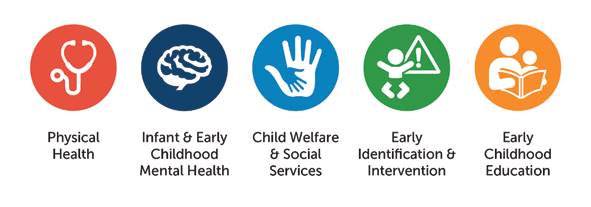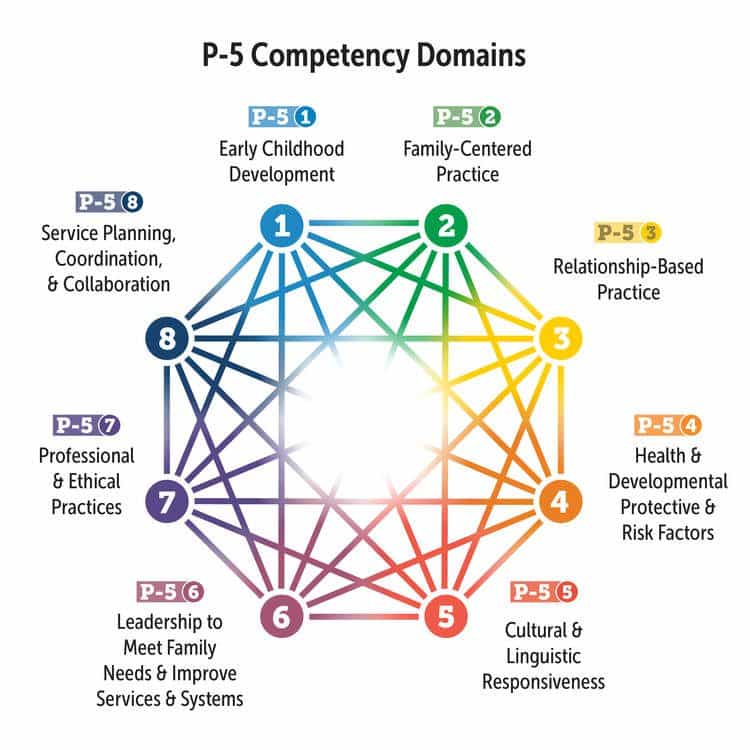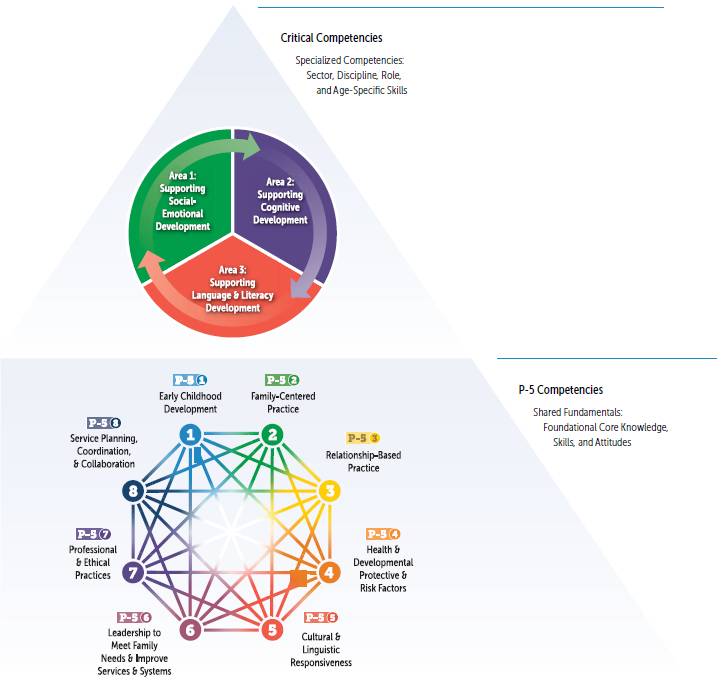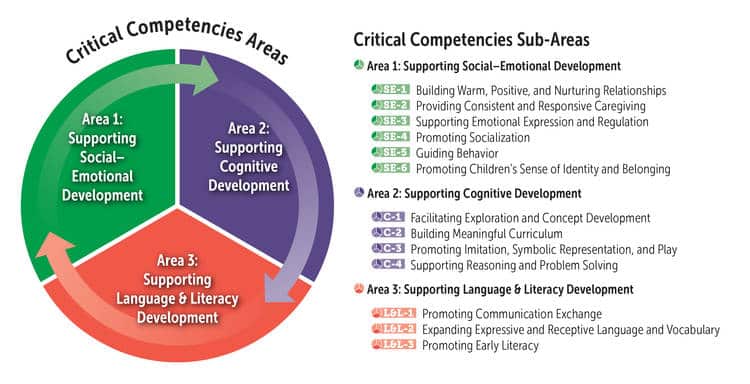Sarah LeMoine, ZERO TO THREE, Washington, DC

Abstract
Standards and competencies are critical structural supports for any professional workforce, including early childhood professionals. Workforce capacity building, career progression, and career longevity can be supported by the foundation of consistent competency expectations. Defining and embedding consistent, evidence-based competencies is a foundational step in realizing significant, sustainable improvements to infant–toddler services. Competencies can help build awareness, readiness, and capacity to change, and support exploration and adaptation in professional practice. ZERO TO THREE defined and provides competency-based education to advance effective early childhood services.
Historically, the various early childhood disciplines and the sectors within them have had different expectations for professional knowledge and competencies, rather than a single set of professional standards delineated by role; most early childhood professional standards and requirements vary according to funding streams and program type (LeMoine, 2008). Yet, professionals in these fields know providing the best services for young children and their families requires a holistic approach. Early childhood professionals play key roles in supporting and nurturing all aspects of learning and development. In the best-case scenarios, professionals partner with families; create systems of primary care; support environments that protect, engage, challenge, and nurture learning and development; and coordinate with colleagues across sectors and disciplines to provide comprehensive services (Dean, LeMoine, & Mayoral, 2016/2019).
Meeting Both Foundational and Specific Needs
ZERO TO THREE’s more than 40 years of experience translating research into a range of practical tools, resources, and professional development, confirms that there are foundational core knowledge, skills, and attitudes needed by professionals in all disciplines working with young children and their families. And evidence confirms these competencies are needed to effectively collaborate and coordinate with one another on behalf of the families they serve—core competencies for all professionals serving young children. To address this need, ZERO TO THREE published the ZERO TO THREE Competencies for Prenatal to Age 5 (P-5) Professionals™ (P-5 Competencies; 2018).
As part of its standard-setting work, ZERO TO THREE has also helped define and describe best practices for infant–toddler teaching. Through collaborative work and targeted analysis, ZERO TO THREE identified that there was little available information about how infant and toddler educators apply foundational knowledge in a group setting, what infant–toddler teaching and learning looks like in practice, and what specific skills educators need to optimize children’s learning opportunities. To address this need, the organization developed the ZERO TO THREE Critical Competencies for Infant-Toddler Educators™ (Dean et al., 2016/2019).
Foundation of P-5 Competencies
The P-5 Competencies are helping to build a secure foundation across and within early childhood disciplines. The P-5 Competencies define the core knowledge, skills, and attitudes needed by professionals in all disciplines who work with young children and their families. The P-5 Competencies present a universal set of competencies necessary for all prenatal to age 5 service providers, supervisors, and managers. The P-5 Competencies have a broad purpose to strengthen professional competence on shared fundamental concepts and to facilitate cross-sector partnerships and coordinated service delivery. The P-5 Competencies also provide a foundation for collaboration and professional development to deepen and support work within and across all five early childhood sectors (see Figure 1).
Figure 1. Early Childhood Disciplines

ZERO TO THREE learning experiences use a competency-based approach to build knowledge, skills, and abilities. The P-5 Competencies (see Figure 2) serve as the framework for all of ZERO TO THREE’s professional development offerings.
Figure 2. P-5 Competency Domains

Source: ZERO TO THREE, 2018, p.10
The Critical Competencies are specialized competencies intended to provide clear, concrete descriptions of specific teacher behaviors and interactions that are known to support critical areas of development during a critical time of development, from birth to 3 years old. The specialized Critical Competencies build on the core knowledge and attitudes defined in the P-5 Competencies (see Figure 3).
Figure 3. Critical Competencies Build on the Foundation of the P-5 Competencies

Source: Dean, LeMoine, & Mayoral, 2016/2019, p. 9
The Critical Competencies (Dean et al., 2016/2019) model is important because:
- It specifically meets the field’s identified gaps and needs, and it directly advances the call from the Institute of Medicine and National Research Council’s committee report Transforming the Workforce for Children Birth Through Age 8: A Unifying Foundation (2015) to:
- Specifically support the infant–toddler early childhood education workforce
- The Critical Competencies are specifically for educators who work in group settings (center-based and family child care homes) with infants, toddlers, or both.
- The Critical Competencies detail essential and observable skills educators can demonstrate to support optimal development and learning experiences for babies and toddlers, including examples in practice with young infants, mobile infants, and toddlers. (See Figure 4, p. 8)
- Develop specific and specialized competencies for this population that build on those for all of the early childhood education workforce
- The Critical Competencies are designed to fill an identified gap and intentionally complement related criteria.
- In partnership with key organizations, the Critical Competencies were cross-walked with relevant criteria in the field to give consolidated and easily understood guidance (see ZERO TO THREE, n.d. for details).
- The Critical Competencies also include links to the child development outcomes described in the Head Start Early Learning Outcomes Framework (U.S. Department of Health and Human Services, 2015) and alignment with infant and toddler teacher observation tools
- Ensure that competencies address the cross-cultural skills needed to work with diverse populations
- The Critical Competencies include specific considerations for adjusting practices to meet the individual needs of infants and toddlers from populations facing significant risk factors and for ensuring a strength-based approach to supporting multilanguage learners
- Specifically support the infant–toddler early childhood education workforce
Figure 4. Critical Competencies Areas and Sub-Areas

Source: Dean, LeMoine, & Mayoral, 2016/2019, p. 18
Using and Implementing the Critical Competencies
The updated version of the Critical Competencies (Dean et al., 2016/2019) emphasized that educator competencies can serve an important role for multiple stakeholders including: individual educators, collaborating professionals, program administrators, professional development (training, technical assistance, and higher education) providers and their organizations/agencies/institutions, and as a basis for professional development systems. Attainment and application of critical knowledge and skills can improve educator effectiveness.
A central tenet of the early childhood field is the individual context at the heart of each child’s development. Similarly, the individual context of early childhood professionals, programs, communities, and systems influence the potential uses of competencies and related professional development needs. To be meaningful and impactful, competencies (and truly any standards) must be used appropriately in the unique context of the individual professional, program, agency, organization, institution, community, and system.
Translating key knowledge into practice can be a daunting challenge for educators, professional development providers, and the systems that support them. To address this challenge and need, ZERO TO THREE’s Professional Development and Workforce Innovations department developed a robust suite of Critical Competencies products and services. The suite is strategically designed for infant–toddler educators and the range of professional development trainers, faculty, coaches, and system leaders who support them.
The skills defined by Critical Competencies can be used by all stakeholders to build a shared understanding of what effective and specific teaching skills that support infants’ and toddlers’ social–emotional, cognitive, and language and literacy development look like. The Critical Competencies provide concrete skill statements and practice examples to help these professionals and the systems that support them successfully bridge the knowledge-to-practice process.
Table 1 provides some example uses of Critical Competencies and the related implementation offerings from the Critical Competencies suite of products and services, listed by stakeholder roles. The examples are intended to be illustrative, not an exhaustive list. Some of the application examples of professional development products and services may be relevant to each stakeholder, some may be applicable to multiple stakeholders, and some may be designed specifically for a single stakeholder.
Table 1. ZERO TO THREE Critical Competencies for Infant-Toddler Educators™ Uses and Implementation Supports
- supplementing and helping systems build on what they have already invested in to fill urgent needs with a long-term, embedded emphasis;
- building the capacity of professional development providers and faculty;
- helping programs to enhance planning, supports, and practices; and
- supporting individuals to reflect on and positively impact their concrete and daily practices with and on behalf of young children and their families.
Learn More
ZERO TO THREE’S Professional Development and Workforce Innovations (PDWI) Department develops pioneering products and services, and it provides customized professional development and technical assistance to individuals, organizations, and agencies around the world. The PDWI Department’s Expert Faculty provides research-informed, competency-based professional development that elevates the knowledge, skills, and abilities of multidisciplinary professionals serving young children and their families.
ZERO TO THREE Competencies for Prenatal to Age 5 (P-5) Professionals
ZERO TO THREE Critical Competencies for Infant-Toddler Educators
Author
Sarah LeMoine, MS, is senior director, Professional Development and Workforce Innovations at ZERO TO THREE. In this role, Ms. LeMoine advances ZERO TO THREE’s education strategy and coordinates these efforts with international, national, and state partners. Ms. LeMoine has focused her career on early childhood professional development systems and workforce issues. She holds a master’s degree in leadership and policy with extensive experience of nearly 30 years ranging from direct service work to national-level research and writing, technical assistance and training, policy analysis, advocacy, and leadership. Previously, she directed the National Center on Child Care Professional Development and Workforce Systems Initiatives at ZERO TO THREE, jointly funded by the Administration for Children and Families’ Offices of Head Start and Child Care, and the National Association for the Education of Young Children’s State Workforce Systems Policy, and she held leadership and technical assistance positions with the National Child Care Information Center and the Wheelock College Center for Career Development. Ms. LeMoine is proud of her service on numerous national and international advisory boards and workgroups to advance early childhood professional systems and practice.
Suggested Citation
LeMoine, S. (2020). Defining competencies for the early childhood workforce. ZERO TO THREE Journal, 40(3), 5–10.
References
Dean, A., LeMoine, S., & Mayoral, M. (2019). ZERO TO THREE Critical competencies for infant-toddler educators™. Washington, DC: ZERO TO THREE. (Original work published 2016)
Institute of Medicine & National Research Council. (2015). Transforming the workforce for children birth through age 8: A unifying foundation. Washington, DC: The National Academies Press.
LeMoine, S. (2008). Workforce designs: A policy blueprint for state early childhood professional development systems. Washington, DC: National Association for the Education of Young Children.
U.S. Department of Health and Human Services, Administration for Children and Families, Office of Head Start. (2015). Head Start early learning outcomes framework: Ages birth to five. Retrieved from source
ZERO TO THREE. (2018). ZERO TO THREE competencies for prenatal to age 5 (P-5) professionals™. Washington, DC: Author.
ZERO TO THREE. (n.d.). ZERO TO THREE critical competencies for infant-toddler educators™ related professional criteria. Retrieved from source




